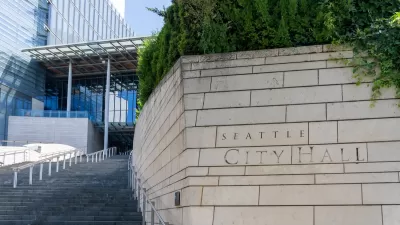Living arrangements designed to encourage social interaction and provide shared facilities can lower the cost of living and build more friendly, supportive neighborhoods.

In a piece for Strong Towns, Emma Avery describes the potential of ‘cohousing:’ housing arrangements with shared amenities that bring down housing costs for residents and create more opportunities for social interactions.
Residents of cohousing projects, Avery explains, “own their private units, but share extensive common spaces. They commit to regular community activities, like meals, and manage the building together.”
Avery highlights an example from Vancouver, where a group of residents joined with a local developer to build their dream communal community. “Over several years, Happy Cities worked with Our Urban Village (formerly called Tomo House) and the design team to help create a super social building — and then to measure whether residents really did feel more connected after moving into their new home.” Results from resident surveys showed a dramatic reduction in loneliness and isolation and an increase in social connections between neighbors.
Noting the barriers to building this type of housing model, Avery argues that cities should make it easier to develop cohousing. “This means offering public land for affordable, socially connected housing; legalizing more density citywide; providing incentives to encourage social design features and offset the costs; and more.” Bringing social connection back into housing developments and neighborhoods can create more sustainable development patterns, help address the housing crisis, and alleviate the growing ‘loneliness epidemic.’
FULL STORY: Can Cohousing Solve the Housing Crisis and Loneliness Epidemic?

Alabama: Trump Terminates Settlements for Black Communities Harmed By Raw Sewage
Trump deemed the landmark civil rights agreement “illegal DEI and environmental justice policy.”

Study: Maui’s Plan to Convert Vacation Rentals to Long-Term Housing Could Cause Nearly $1 Billion Economic Loss
The plan would reduce visitor accommodation by 25% resulting in 1,900 jobs lost.

Planetizen Federal Action Tracker
A weekly monitor of how Trump’s orders and actions are impacting planners and planning in America.

Wind Energy on the Rise Despite Federal Policy Reversal
The Trump administration is revoking federal support for renewable energy, but demand for new projects continues unabated.

Passengers Flock to Caltrain After Electrification
The new electric trains are running faster and more reliably, leading to strong ridership growth on the Bay Area rail system.

Texas Churches Rally Behind ‘Yes in God’s Back Yard’ Legislation
Religious leaders want the state to reduce zoning regulations to streamline leasing church-owned land to housing developers.
Urban Design for Planners 1: Software Tools
This six-course series explores essential urban design concepts using open source software and equips planners with the tools they need to participate fully in the urban design process.
Planning for Universal Design
Learn the tools for implementing Universal Design in planning regulations.
Caltrans
Smith Gee Studio
Institute for Housing and Urban Development Studies (IHS)
City of Grandview
Harvard GSD Executive Education
Toledo-Lucas County Plan Commissions
Salt Lake City
NYU Wagner Graduate School of Public Service





























